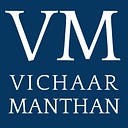Institutionalising Religion
by Pravar Petkar
Religion has been a cornerstone in the flow of human civilization for centuries. This manthan examined institutionalised religion; the systematic organisation of religious beliefs, values and practices into institutions, including buildings, organisations and hierarchies of leadership. Since the Enlightenment, the traditional roles of religion have been steadily eroded and replaced with science and reason. With this intellectual erosion came a dilution of power and influence; although we may see the Catholic Church as a behemoth today, it is but a shadow of its former self. Is this then a bifurcation in the potential futures for religious thought? Are we seeing a slow crumbling of former bastions of morality, or a reimagining of a sustainable form that evolves with society?
Three traditions were discussed in this panel session: Christianity (represented by Rev. Dr Peter Groves), Druidry (by Eimear Burke) and Hindu Dharma (by Acharya Vidyabhaskar). Peter Groves explained that the institution of the Church is central to Christian thinking and its role is that of creating a community where people come together, be together and worship together. In contrast, Eimear Burke set out that the Order of Bards, Ovates and Druids is not institutionalised and non-hierarchical, preserving individuals’ liberty to practise Druidry as they wish. Acharya Vidyabhaskar stated that the core of Hindu dharma is ekam sat viprah bahuda vadanti (one truth expressed in manifold ways). He described Hindu dharma as a rainbow, with infinite different paths and vehicles according to each person’s inclinations.
The distinction between believers and non-believers in institutionalised religion is clear and can be highly divisive. Eimear Burke suggested this distinction is absent in Druidry, which is sustainable as it allows people with diverse beliefs to evolve together. Acharya Vidyabhaskar added that Hindus are the only tradition that include atheists amongst all others, so long as one is respectful and has a genuine sense of inquiry. This stems from a pan-realist view of the absolute reality. On the other hand, Peter Groves argued that the Enlightenment has created an apologetic account of religion where one must assent to certain propositions of belief, creating this distinction, but that we need to engage in ‘religious archaeology’ to rediscover the foundations of a more plural world, perhaps alluding to the once vibrant tradition of Gnosticism within the Christian fold.
On proselytization, Peter Groves acknowledged that the Christian narrative is expansionist in tone, with some unfortunate consequences for its politicised aspects, suggesting a need to engage those with no sense of the spiritual without explicit conversion. Acharya Vidyabhaskar mentioned that Hindu dharma has spread across the world without a ‘commission of Christ’ but rather through the work of charismatic individuals; in this light, India’s greatest export to the world has been Buddhist thought. Eimear Burke concluded by stating that it is not the Druid way to proselytise, but using technology, the number of Druids is growing and Druidry is becoming more influential without trying.
In an era dominated by science, Acharya Vidyabhaskar suggested that religion, where it is not fundamentalist in nature, is experiential and not about subscribing to certain prescribed beliefs. The consciousness under study at Stanford University is the state in which emotions and mental states arise, and one may discover their divine nature through meditation. Eimear Burke echoed this, suggesting that the spiritual practice of Druidry is essential for spiritual self-development today and the Druid idea of interconnectedness with all things is a useful radar system for navigating our world, creating an inherent sense of altruism. Peter Groves concluded that “religion is part of being human, whether people like it or not” and that the search for the spiritual takes one beyond their own limits and connects them to the ‘ultimate’.
This panel session shows that in many respects, a sustainable future will emerge from moving beyond institutionalised religion towards forms of spirituality that prioritise individual freedom, do not ‘other’ non-believers and which grow organically and not by the force of conversion. Although science is dominant in today’s world, this spirituality can still provide us with a valuable guide by which to navigate the world in flux.
